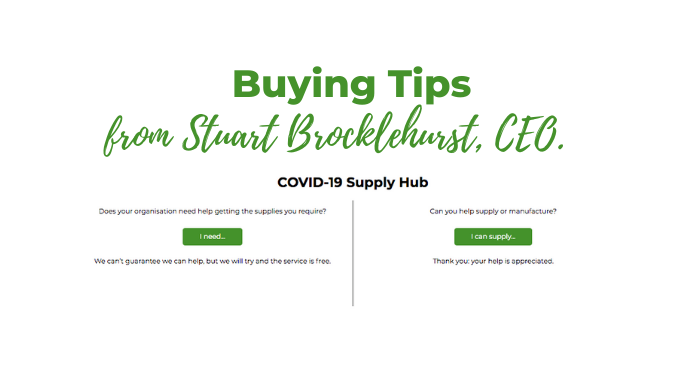It's been a week now since we launched the COVID-19 Supply Hub as a free service to help out during the current challenging situation. Already we've helped 92 organisations procure the equipment and supplies they need - PPE, respirators, sanitiser and more - including nursing homes, care agencies, hospices, councils, schools and charities. It's clear that many find themselves in uncharted territory finding suppliers for items they either didn't need to buy before or the supply of which they could previously take for granted. This blogpost is intended to give a few tips to help those facing the challenge of buying for their organisations.
Firstly, it's worth revisiting why supply has suddenly become so difficult. It's a perfect storm: demand has skyrocketed across the world, at just the same time that supply and transport are disrupted. Some factories have had to close, others have significant staff shortages, or have had to reduce the number of staff on production lines to ensure social distancing. Difficulty obtaining supplies and spare parts from other producers may in turn disrupt their production. Air freight from countries such as China has pretty much dried up, moving delivery lead times from days to weeks, and transport providers may have their own issues with staff sickness or self-isolation, vehicle maintenance and so forth. In short, this is not a normal situation.
That means that buying goods may not be quite like normal either. If items are coming from Asia, there may be a month's wait for them to arrive by sea-freight. Where UK manufacturers have stepped into the breach, with wages, rent and most other costs much higher here than in emerging markets, the cost of the goods is likely to be higher as well.
So, in this unusual situation, how do you get the best results?
Tip one: details matter
The more detail you can give suppliers, the more chance you're giving them to provide a good response. So, if you need sanitiser, what percentage proof alcohol should it be? What size bottles? If it's face masks, what type? Are there standards they must meet? For all items, what's the delivery address? At a time when many suppliers are working flat out to respond to requests, the clearer you can be, the better the chances of getting the right response first time.
Tip two: be flexible
Given the supply situation, it may well be that none of the responses from suppliers are exactly what you want - like a latter day Goldilocks you may find that one is for a larger quantity than you'd like, another - importing by sea - is for a later delivery date, one offers an alternative product and another, maybe manufacturing locally with much higher costs of production, quotes a higher price than you'd normally pay. Right now, it may be that compromises have to be made: you might combine an immediate order for more expensive locally produced equipment with another at a lower price for items to be shipped in by sea. If minimum order quantities are higher than you need, perhaps clubbing together with others in your area could meet the threshold. Clearly it's not ideal, but the ideal may simply not be available right now.
Tip three: plan ahead
Once this is all over there will be quite a debate to have over 'just in time' procurement. That can wait for another day, but in the current circumstances it's just not a good idea. The supply situation is changing constantly, new lockdowns may be imposed, transport may face fresh disruption. Planning out your needs ahead and sourcing the goods you will require now is essential to mitigate the risk of having insufficient equipment. That may have cashflow implications - we can't advise on those - but the implications of not doing so could be far more serious.
Hopefully those hints are some help. If you have other queries, our staff are here to support you as you raise requests in the system, please do call or use the livechat facility. And if there's anything else you'd like to see blogposts on, do shout!

